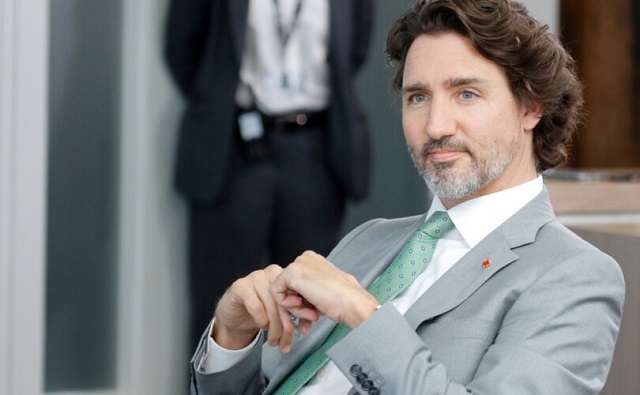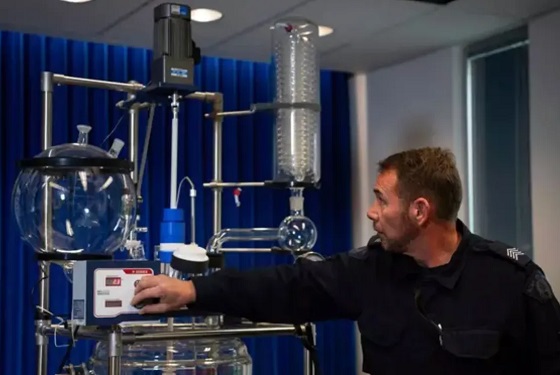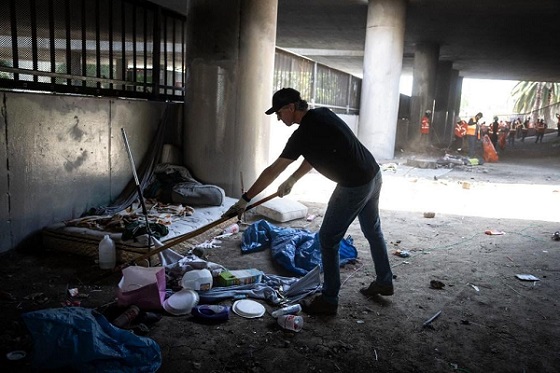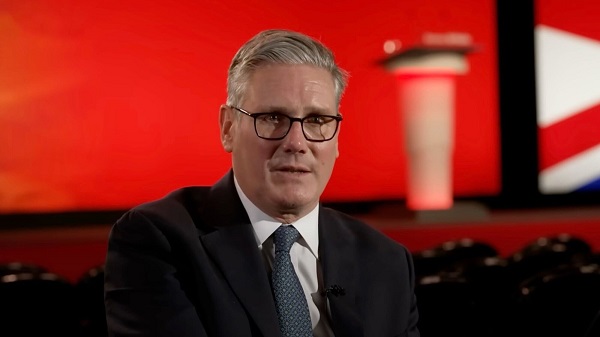Crime
Online Harms bill could see Canadians face house arrest based on citizen complaints: Constitutional lawyer

From LifeSiteNews
Constitutional lawyer Marty Moore has warned LifeSiteNews that under the proposed Online Harms Act, courts could impose restrictions on Canadians under threat of jail if there is ‘fear’ the accused may commit a ‘hate crime’ in the future.
A top constitutional lawyer has told LifeSiteNews that the most “shocking” part of the Trudeau government’s proposed “Online Harms Act” is that it could allow provincial courts to impose house arrest on Canadians over a “fear” that they may commit a “hate crime” in the future.
“Possibly the most shocking part of this Bill is the addition of section 810.012 to the Criminal Code,” Marty Moore, who serves as the Litigation Director for Charter Advocates Canada, which is fully funded by the Justice Centre for Constitutional Freedoms (JCCF), told LifeSiteNews.
“Under this new provision, a person can assert to a provincial court that they ‘fear’ someone will promote genocide or antisemitism, and that provincial court is empowered to jail a person for one year (two years if they have previously been convicted of such an offense) if they refuse to agree to court-imposed conditions.”
Moore noted that the “court-imposed conditions” could be the mandated wearing of an ankle monitor, having a curfew, or not communicating with certain people.
Similar pre-crime punitive tactics may also be carried out against Canadians for other so-called “hate” offenses unrelated to antisemitism or genocide, something Justice Minister Arif Virani, who introduced Bill C-63 into Parliament Monday, continues to defend.
“[If] there’s a genuine fear of an escalation, then an individual or group could come forward and seek a peace bond against them and to prevent them from doing certain things,” Virani said Wednesday, arguing that such tactics “would help to de-radicalize people who are learning things online and acting out in the real world violently – sometimes fatally.”
If passed, Bill C-63 will create the “Online Harms Act” and modify existing laws, including the Criminal Code and the Canadian Human Rights Act, in what the Liberals under Prime Minister Justin Trudeau claim will target certain already illegal internet content such as child sexual abuse and pornography.
However, the proposed law also seeks to target broadly defined “hate speech,” leading many Canadians to worry the bill is a trojan horse being used to usher in political censorship.
Most worryingly, the new bill will allow it so that anyone can file a complaint against another person with the Canadian Human Rights Commission for “posting hate speech online” that is deemed “discriminatory” against a wide range of so-called protected categories. The bill even includes a provision that allows the Commission to withhold the identity of the accuser from the accused, effectively paving the way for Canadians to have to defend themselves against anonymous complaints.
Moore, as reported by LifeSiteNews on February 27, previously said that the “Online Harms Act” will allow a new “Digital Safety Commission” to conduct “secret Commission hearings” against those found to have violated the new law, which raises “serious concerns for the freedom of expression” of Canadians online.
According to the bill’s text, Canadians could soon face life imprisonment for certain “hate crimes,” in addition to other years-long prison terms and hefty fines for online posts the government deems as “hate speech” on the basis of gender, race and other categories.
Bill gives overly ‘broad definition’ to the term ‘hateful content’
In additional comments to LifeSiteNews about Bill C-63, Moore warned that the bill gives a broad definition to the term “harmful content.”
“The definition of ‘content that incites violence’ could capture someone encouraging minor property damage in a context where it ‘could cause’ a person to do something that ‘could’ interfere with an ‘essential service, facility or system,’” Moore told LifeSiteNews.
“Similarly, the definition of ‘content that incites violent extremism or terrorism’ could capture expression that encourages minor property damage in the course of political protest designed to pressure government on a particular issue, if the expression ‘could cause’ a person to do something that ‘could cause’ a ‘serious risk to the health or safety of the public,’” he added.
Moore observed that given Canadians recent experience in dealing with COVID mandates and lockdowns, which “literally banned protests on the basis that they could cause a risk to the health or safety of the public,” it is not hard to see how “these provisions” in Bill C-63 could be used to “censor expression advocating for civil disobedience and, other than minor property damage, peaceful protest.”
To enforce the proposed law, the bill calls for the creation of a Digital Safety Commission, a digital safety ombudsperson, and the Digital Safety Office.
The ombudsperson along with the other offices will be charged with dealing with public complaints regarding online content. It will also put forth a regulatory function in a five-person panel “appointed by the government,” whose task will be monitoring internet platform behaviors to hold people “accountable.”
Moore told LifeSiteNews that Canadians have already seen government “grossly abuse Canadians’ rights and freedoms in the name of preventing harm and ensuring safety (COVID mandates).” He noted that this bill could give a commission of unelected officials a “concerning” amount of “reach” into “Canadians’ lives.”
In addition to Moore, Conservative Party of Canada leader Pierre Poilievre has also indicated the proposed law may be dangerous, saying earlier this week that the federal government is merely looking for clever ways to enact internet censorship laws.
On Tuesday in the House of Commons, Poilievre came out in opposition to the Online Harms Act, saying that if the Trudeau government’s goal is to protect children, he should be enforcing criminal laws rather than censoring opinions online.
Crime
The “Strong Borders Act,” Misses the Mark — Only Deep Legal Reforms Will Confront Canada’s Fentanyl Networks

The fallout is a grim roll call of major investigations that collapsed before trial in British Columbia, Alberta, Ontario, and Quebec: Project E-Pirate, E-Nationalize, Syndicato, Cobra, Brisa, and Endgame all aborted.
Bill C-2, Ottawa’s so-called “Strong Borders Act,” promises to secure Canada’s frontiers with new surveillance powers, sweeping ministerial discretion, and higher penalties. But as veteran Canadian investigators know, the bill misses the point. It is an omnibus solution that expands the state’s reach online, while leaving untouched the very legal choke points that have made Canada a permissive financial platform and fentanyl laboratory for cartels, Triads, and state-linked terror networks.
For more than a decade, Canadian and U.S. enforcement leaders have pointed to the same failures. Police are confronting transnational fentanyl labs, a flood of Chinese chemical precursors, Hezbollah-linked laundering, and Mexican cartels setting up on Canadian soil.
Yet they are forced to fight these threats with laws “never designed for today’s criminal landscape,” as Canadian Chiefs of Police president Thomas Carrique recently warned.
Former RCMP investigator Calvin Chrustie testified before British Columbia’s Cullen Commission that, due to judicial blockages arising from Charter of Rights rulings, by 2015 it had become effectively impossible to obtain wiretaps on Sinaloa Cartel figures in Vancouver.
This year, RCMP Assistant Commissioner David Teboul said a proliferation of “commercial-grade chemistry” fentanyl labs in British Columbia — like the sophisticated factory dismantled last year in Falkland, north of Lake Okanagan, where Mexican cartels have quietly taken over domestic biker gang networks — underlined the urgent need for legislative reform.
Canada wasn’t always so overwhelmed by lethal foreign gangs. What happened? Overly permissive immigration rules and porous borders explain part of the story, but the deeper problem lies in the laws that have steadily eroded enforcement power since the early 1990s.
Instead of enabling prosecutions against transnational traffickers of humans, narcotics, and weapons, unintended consequences from misguided jurisprudence surrounding Canada’s Charter of Rights now ensure these cases almost always collapse, or are simply avoided by the Crown.
Two Supreme Court rulings — Stinchcombe and Jordan — have gutted the capacity to prosecute complex crime. Stinchcombe requires exhaustive disclosure of sensitive intelligence, often impossible in Five Eyes investigations that depend on close cooperation between Canada and the United States.
Jordan imposes strict trial ceilings that tick down while Stinchcombe disclosure battles drag on. Criminal lawyers know these two rulings function as trump cards stacked in favor of their clients.
The fallout is a grim roll call of major investigations that collapsed before trial in British Columbia, Alberta, Ontario, and Quebec: Project E-Pirate, E-Nationalize, Syndicato, Cobra, Brisa, and Endgame all aborted. Project Collecteur — a landmark probe linking Hezbollah and foreign terror-financing networks across Canadian cities to transnational drug money laundering, built on U.S. and Australian intelligence — barely made it to court, despite its far-reaching implications.
It was crippled by RCMP corruption and by underfunded, risk-averse agencies that abandoned Canadian leads painstakingly developed by Five Eyes partners.
How bad was it?
Farzam Mehdizadeh, a major Iranian money launderer and suspected weapons proliferation actor who ran a Toronto currency exchange while shuttling bags of drug cash between Toronto and Montreal, escaped back to Iran just as the RCMP was poised to arrest him on money-laundering charges. The beneficiary of a leaky national police force, evidently.
A senior U.S. enforcement source told The Bureau that during Project Collecteur, the RCMP stumbled onto an even bigger Chinese money launderer while probing Iranian networks, but the agency ignored the file — reportedly unable to shift its original investigation focus onto new enterprise targets.
These kinds of policing failures and decisions are part of the reason President Donald Trump has said senior U.S. investigators told him that Canada lacks the resources and capacity to confront fentanyl trafficking gangs.
In Washington, there is frustration — and at times a lack of understanding — that Stinchcombe either bars or effectively scares the Mounties out of cooperating with U.S. agencies or sharing intelligence.
Derek Maltz, former DEA chief under President Trump, pointed to the Falkland fentanyl super-lab case — part of a U.S.-led probe into Chinese precursor suppliers — as the latest example of “historical issues with the RCMP not sharing properly,” calling it a “major disaster that happened on that big lab in British Columbia.”
“It goes down to the basic information sharing, the antiquated laws,” Maltz said. After meeting with current Canadian police leadership, he concluded: “They’re so far behind and the laws are so antiquated and so archaic.”
The cost is staggering. Officers walk away from enterprise files, knowing they cannot meet disclosure or trial deadlines. Prosecutors refuse to take high-risk cases. U.S. agencies stop sharing intelligence that could be exposed in open court. Canada defaults to “low-hanging fruit” prosecutions while the upper echelons of global networks operate with near impunity.
Meanwhile, at the border, permissive Non-Resident Importer rules allow foreign entities to move chemical precursors through Canadian ports under layers of corporate opacity. Chinese logistics hubs repackage bulk fentanyl shipments bound for Vancouver, obscuring Canada’s visibility into their true origin. Once in Canada, packages can be collected by foreign nationals who further conceal their identities. To visualize the scheme, think of an “end-to-end encryption” app — Chinese trafficking networks enjoy the same kind of seamless concealment when shipping narcotics into Canada.
At the same time, Vancouver’s port — stripped of federal police under Jean Chrétien’s Liberal government — has container inspection rates below one percent, according to a British Columbia study.
It doesn’t seem that Bill C-2 will do anything to address these core vulnerabilities. It gives Ottawa broad powers to expand online surveillance, which may help with the drug networks that now brazenly advertise street sales on social platforms. But it would do so by subjecting all Canadians to invasive cyber surveillance. The bill does not target the transnational criminals who are already easy to identify and well known to law enforcement. These networks continue to operate openly in Canada, confident that the Charter shields them from real prosecution.
Meanwhile, experts warn that parts of C-2 resemble Ottawa’s wish list of new powers tossed into a grab bag. The effect is the opposite of inspiring public confidence or addressing the real enforcement crisis. As written, Bill C-2 could do more harm than good. Mark Carney’s government should shelve it and start again with the reforms Canada actually needs.
The Bureau is a reader-supported publication.
To receive new posts and support my work, consider becoming a free or paid subscriber.
Crime
Drug trafficker says Trump battle with the cartels is making an impact

Quick Hit:
A Sinaloa Cartel leader told CNN that President Trump’s border crackdown has made cartel operations “much tougher,” admitting the gang’s smuggling business has been disrupted by the administration’s hardline approach.
Key Details:
- CNN correspondent David Culver interviewed the masked cartel member in the back of an SUV. The man — clad in black clothing, gloves, and sunglasses — conceded that Trump’s policies have made his criminal work harder, responding flatly, “Oh yeah. Yeah.”
- He said Trump’s border enforcement has disrupted cartel routes and made smuggling riskier, limiting the group’s ability to operate freely.
- The trafficker, who admitted to killings and cross-border crimes, said he wanted to warn others, telling CNN, “It’s not a life. It’s not good… Once you get in, you can’t get out.”
A member of the Sinaloa Cartel — responsible for trafficking untold amounts of deadly drugs into our country — says President Trump has unquestionably made his job tougher.
The Trump Admin will not relent until this evil has been eradicated from our country once and for all. pic.twitter.com/1dNYEHlyQi
— Rapid Response 47 (@RapidResponse47) September 30, 2025
Diving Deeper:
In a rare on-camera interview, a senior figure in Mexico’s Sinaloa Cartel — once run by Joaquín “El Chapo” Guzmán — acknowledged that President Donald Trump’s border and immigration crackdowns are taking a toll on cartel operations. CNN’s David Culver conducted the shadowy interview in the back of an SUV, describing the man as a hardened killer who has “done it all — from killing to coordinating smuggling operations.”
Asked directly if Trump’s border actions have made his job more difficult, the man didn’t hesitate. “Oh yeah. Yeah,” he replied. When Culver pressed further, he added, “Yep.” His matter-of-fact admission underscored what many border agents have long said — that Trump’s aggressive policies are slowing cartel activity and making it costlier, riskier, and far less predictable.
CNN noted that under Trump’s enforcement posture, major smuggling routes have been cut off or heavily monitored, forcing traffickers into less profitable, more dangerous corridors. Those operational disruptions have led even cartel insiders to acknowledge the effectiveness of U.S. countermeasures.
Despite his own record of violence, the masked trafficker told Culver that he wanted to deter others from following his path. “It’s not a life. It’s not good,” he said in broken English, before warning in Spanish, “Once you get in, you can’t get out.”
The man’s comments echoed those of former Sinaloa operative Margarito “Jay” Flores Jr., who told Fox News last month that Trump’s “aggressive approach” would “send a strong message to every drug trafficker across Latin America.” Flores, who worked under El Chapo’s network, said the Trump administration’s actions had already shaken criminal supply chains across Mexico and Central America.
That aggressive campaign appears to be continuing. NBC News recently reported that U.S. forces are preparing operations targeting cartel-linked trafficking hubs inside Venezuela — part of a broader strategy to dismantle networks at their source.
Taken together, the admissions from cartel veterans and the administration’s expanding reach leave little doubt: even the world’s most ruthless traffickers are feeling the pressure. President Trump’s border crackdown is working — and the cartels know it.
-

 Alberta2 days ago
Alberta2 days agoAlberta’s E3 Lithium delivers first battery-grade lithium carbonate
-

 Automotive2 days ago
Automotive2 days agoCanada’s EV subsidies are wracking up billions in losses for taxpayers, and not just in the auto industry
-

 Business2 days ago
Business2 days agoLA skyscrapers for homeless could cost federal taxpayers over $1 billion
-

 Crime1 day ago
Crime1 day agoThe “Strong Borders Act,” Misses the Mark — Only Deep Legal Reforms Will Confront Canada’s Fentanyl Networks
-

 Business1 day ago
Business1 day agoUK Government Dismisses Public Outcry, Pushes Ahead with Controversial Digital ID Plan
-

 Agriculture20 hours ago
Agriculture20 hours ago“We Made it”: Healthy Ostriches Still Alive in Canada
-

 Energy2 days ago
Energy2 days agoNuclear power outperforms renewables every time
-

 Artificial Intelligence2 days ago
Artificial Intelligence2 days agoAI chatbots a child safety risk, parental groups report





